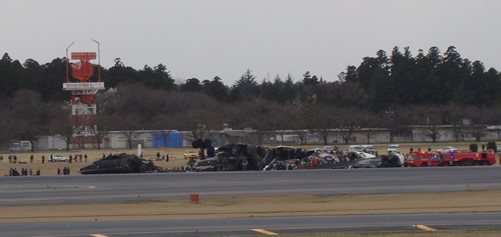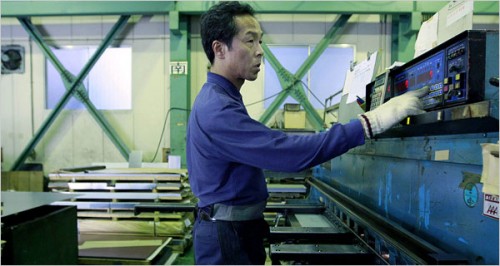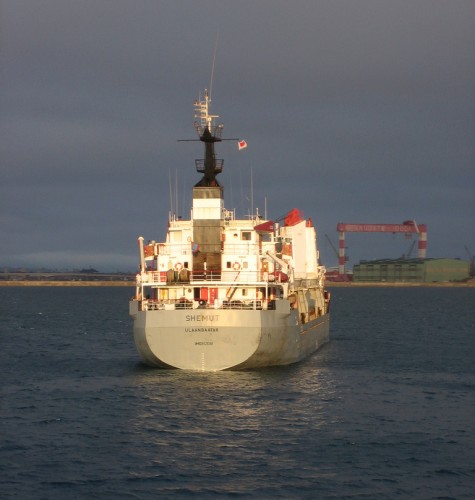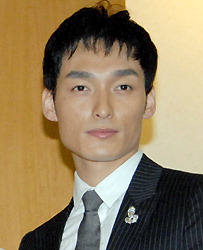If Insane Clown Posse fans are Juggalos, does that make MFT readers Muffalos? Maybe not, but this video is just insane (via Time Suck):
Category: Apocalypse
When aliens attacked Kawasaki
Continuing the alien theme started by Curzon:
Close to midnight on August 5, 1952, four American air traffic controllers walking across the tarmac at Haneda Airport (then a US military base) spotted a round, bright object in the sky over Tokyo Bay. They went up to the tower and took a look through their binoculars, and noticed a larger dark ellipse surrounding the light.
Over the next few minutes, the controllers tried to get visual confirmation from an airborne observer plane, which couldn’t see anything. They were able to get a radar fix on the UFO, though, and so they had a scrambled fighter jet intercept it. The pilots didn’t spot the UFO, though, and shortly after the radar intercept the UFO disappeared.
The original US Air Force report is available in scanned format here. Nobody was ever able to explain what happened; my personal theory is that the aliens were coming for Kenzo Tange so they would have someone to do their design bidding on Earth.
Roppongi still a seething cauldron of poison
Just got this warning from the US embassy:
July 10, 2009
Warden Message – Roppongi Security Notice: Drink Spiking
The U.S. Embassy continues to recommend that American citizens avoid frequenting bars and clubs in the Roppongi area of Tokyo due to drink-spiking incidents.
The U.S. Embassy continues to receive reliable reports of U.S. citizens being drugged in Roppongi-area bars. Most reports indicate that the victim unknowingly drinks a beverage that has been secretly mixed with a drug that renders the victim unconscious or stuporous for several hours, during which time large charges are fraudulently billed to the victim, sums of money are charged to the victim’s credit card, or the card is stolen. Victims sometimes regain consciousness in the bar or club, while at other times the victim awakens on the street. Assaults on Americans have also been reported in connection with drink-spiking.
Sign up for updates here.
Krauthammer on Japan nukes
<object width=”480″ height=”385″><param name=”movie” value=”http://www.youtube.com/v/hjBVAmjqp3s&hl=en&fs=1″></param><param name=”allowFullScreen” value=”true”></param><param name=”allowscriptaccess” value=”always”></param><embed src=”http://www.youtube.com/v/hjBVAmjqp3s&hl=en&fs=1″ type=”application/x-shockwave-flash” allowscriptaccess=”always” allowfullscreen=”true” width=”480″ height=”385″></embed></object>
When I checked the news sites this morning I noticed that Andrew Sullivan had linked to this clip of Krauthammer calling for Japan to “declare itself a nuclear state” in response to North Korea’s becoming a “nuclear power,” with the comment “yeah, China will go for that.” For me, the bigger question is whether Japan would go for that. Although the possibility of a nuclear-armed Japan is less taboo than it used to be thanks to repeated broaching of the topic by a loose coalition of right-wing political figures, the public at large is still strongly opposed. For example, a public opinion survey conducted in November 2006 shows 14% in favor, 78% against. Those numbers will likely be shown to have changed slightly in the inevitable followup surveys to come within the next week or two, but I would not expect a radical shift.
Incidentally, take note of Krauthammer’s phrasing: “negotiations with the Japanese to encourage them to declare themselves a nuclear power.” He seems to be working under the widely held assumption that Japan already holds all of the technology necessary to build a nuclear bomb (almost certainly true), and had secretly laid all of the necessary groundwork short of the final stops (possibly, but less certain) in such a way that they could have weapons ready within weeks should they suddenly become permissible.
But even if the technology is ready, I just don’t see it happening. Constitutional revision allowing a more conventional military is slowly becoming more and more possible, but decades of anti-nuclear education will not be overturned as easily, whatever the fantasies of American neo-cons.
Random gaijin mail magazine dude nails it on Japan’s media-fueled swine flu panic
(Updated below)
I don’t remember when, but at some point I became subscribed to this guy’s mail magazine “Glimpses of Japan.” I can’t remember and can’t find the full name of the author (maybe he’ll come forward!) but his name is Mike, from a picture I saw once he looks like he’s in his late 40s, and he works at NEC Learning which is a provider of what appears to be classroom technology. He’s been in the country for what seems like forever and has an interesting sort of grizzled veteran’s take on developments here, though this seems to be written with an ESL audience in mind.
More often than not, he’s griping about the traffic in Tokyo, but this week’s post was so spot-on I want to share it with you in full. Enjoy:
Media Malady
2009.5.22
*****—————————————————————–*****Once again I’m bemused by the pathetic state of the mass media here, particularly the TV news. The phrase “media circus” is often used to describe the antics of (especially) broadcast media when they get into frenzied over-reporting mode, but I don’t think that’s appropriate for the Japanese media’s latest hysterical outpouring of pseudo-news: if it were a circus it would at least be entertaining.
It’s bad enough that the Japanese government has decided to regard the “Novel Influenza A (H1N1)”, previously called the “swine flu”, as if it were much more serious than the rather mild, easily treatable influenza virus infection that it is. The media have been treating the “outbreak” as if it were the Black Death.
Breathless, serious-looking reporters stand in front of hospitals saying, in worried tones, things like, “this is the hospital where the 16-year-old high school student flu patient is staying”. I understand that TV news is a visual medium, and that they want to be able to show something, but a guy standing in front of a building just isn’t newsworthy, particularly when they are avoiding giving the names of the patients and the hospitals, for privacy reasons. It’s just not *news*, and serves only to make people more anxious about something barely worth worrying about.
With companies and local governments over-reacting by closing down schools, postponing events, and canceling business trips, an aura of panicked fear is being encouraged and expanded by the media’s relentless and largely content-free approach to reporting what little actual news there is. Huge signs on news sets show the number of people who have contracted the flu nationwide (not very many, actually, as a percentage of population, roughly comparable to the number of traffic accident *deaths* in Tokyo in a year), many of whom are already nearly recovered.
It can’t be making people feel more confident to see that, even with the science-fiction-like biohazard suited crews going aboard aircraft before passengers disembark, the flu still managed to spread, either.
There’s also more than a little xenophobia involved in the reporting, and in people’s responses to the influenza news.
I understand that there have been clueless, panicked, ignorant people asking local governments whether it’s safe to hang laundry out to dry and whether their pets are in danger. In the true spirit of TANSTAAFL, I also understand that many of the high school and junior high school kids who have been prevented from attending school in order to stop the spread of the flu…are taking advantage of the time off to gather in Karaoke rooms. That’s bound to be counter-productive.
Speaking of counter-productive, having the prime minister appear on TV in a kind of public service announcement, looking worried as he tells people not to be anxious and not to over-react or to believe spurious rumors…*that’s* a great way to cause people to worry *more*, not less.
I have a large capacity for being amused at the bizarre and the stunningly ridiculous, but the current exaggerated media handling of what should be a very minor issue
exceeds my ability to laugh.I was, it’s true, cynically amused by a friend’s suggestion that the whole government/media pseudo-news frenzy/circus is a conspiracy to take the Japanese public’s mind off the terrible economic conditions and the administration’s inability to deal with them. I don’t seriously think that’s the case, but it would at least be more logical than what the truth seems to be.
Glimpses of Japan vol.240
On the surface, the overall media reaction to what could have been a serious outbreak seems fact-based and rational (with notable exceptions!). They followed every government move and reported on the infections. And basically the government did what it should have – maybe there was an over-emphasis on masks and they were a little slow to switch tactics when the virus turned out to be relatively harmless. But I have to agree with Mike and Takashi Uesugi who argue that the media completely freaked out over the swine flu. The breathlessness, the dead-serious tone, and the constant “breaking news” of every miniscule detail of the story all have combine to create an fearful atmosphere that’s truly numbing when you realize how comparatively non-threatening this flu virus really is.
That’s what leads people to believe they all need to wear masks to prevent infection, which did in fact cause well-publicized runs on the masks and opportunistic online auctioners. As Durf noted on Twitter, “The media set out to increase media importance to viewers, as usual; breathless reporting on panic-worthy stuff is the way to go!” This was the media trying to make themselves seem important through play-by-play reporting on whatever the scandal of the moment happens to be. A recent example of a how this behavior can get a little overblown was the flap over whether the kanji test guys made too much money from their massively popular product.
I don’t think the media all sat down and decided to incite panic. In fact, maintaining the status quo and helping to keep public order seems to be one of their missions that they take seriously. What’s more likely is every media outlet decided to take this threat very seriously and follow this potentially age-defining story closely, as they always do for the scandal/story de jour. Just in the case of a flu outbreak, the sum of their actions proved incredibly neurosis-inducing. As usual, whenever someone tells you “stay calm” or “don’t panic” that’s usually exactly what makes you start to panic!
On that last line about a government conspiracy to crowd the headlines with flu stories – I personally think there is something to it. The government (meaning the Aso administration, not the health officials) doesn’t have to have orchestrated the entire media response to fuel it to their advantage. And not everyone in the government is necessarily on the same page. Looking at health minister Masuzoe’s press conferences, for example, I get the impression that rather than cheaply exploit the scandal by burying other stories and panicking the public, he seeks to project an air of competence and cool-headedness (Aso’s “nobody panic” TV commercials, on the other hand, are a different story). And from a health standpoint the actions taken don’t seem too insane. I mean, the health checks and monitoring were necessary, and they didn’t do anything drastic like shut down Osaka just to help Aso’s opinion polls.
But it seemed like there was something in the public announcement that could have egged the media on. One especially dubious move was the government announcement that they specifically requested the mask companies to boost production – as if they needed to be told! Truly, it would be tragic and counterproductive if actual sick people couldn’t get their hands on masks because fearful healthy people bought them all.
What the government should be doing but isn’t doing enough of is actively calming people without screaming OK NOBODY PANIC. A good example was what Masuzoe did last week – he explained the facts about the flu without exaggeration or alarm and noted that the current status of the outbreak meant the government could tone down its response and stop in-flight inspections.
Interesting side note!!! On the asahi.com front page is this line advertising their swine flu special full coverage section: 予防にはまず手洗い “For prevention, first wash your hands”
Funny, what happened to listing masks first as the best line of defense just a week ago?! Well, since I posted my anti-mask rant (which itself attracted a decent readership in the Japanese blogosphere thanks to mozu which may inspire me to write some more in Japanese despite mozu’s warning of the “risk”) blogs and several major media outlets (Yomiuri print edition, Asahi (“don’t believe in masks too much”), and J-Cast so far as I can tell) have noted the CDC/WHO recommendations and the practices of other countries. Durf notes that at least one doctor on TV said to “ignore masks.” Unfortunately I don’t have time to document this in detail, but it is interesting to see how the message has evolved from GO GET A MASK NOW to some more rational consideration.
Most of the reaction came as a result of stories from places like the LA Times, so I think whatever impact I had was very small. But I think it was healthy that there was some signficant skepticism and pushback over the recommendations for EVERYONE to go out and get a supply of masks.
As the virus spreads to Tokyo, the call for MASKS MASKS MASKS will not end. The train operators are already campaigning for it in what seems more like a CYA maneuver than anything else. I mean these companies may be sued or publicly shamed if they don’t put forth a forthright and careful response. (Are you for preventing the flu or are you siding with the terrorists?) But at least we can remember to just consistently wash our hands and cough into our sleeves, we don’t need to succumb to this ill-informed misinformation.
Update: Somehow I missed this: the head of the health ministry’s flu response came out on May 21 to declare that it’s not necessary for people to wear masks “in outdoor areas where there is not much crowding.” And went on to explain, “Masks are intended to prevent infected people from spreading the virus. Please wear one if you have a cough.”
Japan’s secret army of zombie factory workers
For decades American manufacturers watched in horror as their Japanese rivals cannibalized their market shares by making better and cheaper products with none of the setbacks of strong unions. Today’s NYT might include some secret hints as to how those crafty Japanese were able to pull it off.
You see, their recent article discussing the Japanese “lifetime employment” system inexplicably contains the word “zombie” in the URL (html file name: 20zombie.html), accompanied by this photo:
The man has clearly been conditioned to channel his thirst for brains into a more productive dedication to just-in-time delivery. That’s right, Japanese workers can never be fired but in exchange they never die and never take days off.
So if you’ve been following along, that means the Jewish lizard people who run the One World Government are now controlling zombie Japanese factory workers to deprive American union workers of their jobs. Someone get Benjamin Fulford on the phone!
Spanish flu was not Spanish
With the swine flu suddenly in the news, some might wonder why the authorities are so frantic to stop the disease in its tracks. For context, it might be worthwhile to mention the modern world’s worst disease outbreak, the deadly Spanish flu of 1918 that killed tens of millions.
But ironically, the “Spanish flu” almost certainly did not originate in Spain.
The only reason it acquired the name was because of Spain’s neutral position during World War I. Other countries at war instituted press restrictions, and the decision was taken not to report widely about the flu epidemic out of fear it would hurt morale. Since Spain had no such restrictions it was the only country in Europe reporting an outbreak, hence fooling observers into thinking that’s where the flu had come from.
(Source: Read in yesterday’s Yomiuri)
Planet Joe
In a post on the Somalian piracy issue, the folks at NPR’s Planet Money point out how odd it is that some ships fly the flag of landlocked Mongolia (it comes down to tax/regulatory incentives), photo courtesy our own Joe Jones!
He’s got a bunch of other great photos on his Flickr site.
Though it may be an online-only podcast, Planet Money is fast becoming my favorite NPR program after This American Life and On The Media. They slow everything down and give context to the news, avoid shorthand and jargon, and generally make the day’s developments imminently accessible and understandable. Too often the news seems out of context and complicated, and no doubt turns away a lot of people before they can really even try and get a handle on things. Their approach is refreshing and sorely needed in other areas of the news!
The show originated as a spinoff of the amazing work they did for TAL, which is a must-listen to get a decent idea of what’s happening with the financial crisis:
The Giant Pool of Money (step-by-step, player-by-player breakdown of the subprime crisis)
Bad Bank (A follow-up made in February that similarly explains the developments of the financial crisis and what should be done with the banks)
Scenes from a Recession (This is a more traditional This American Life episode that takes a man-on-the-street approach to see how the recession is affecting people)
I’ve said it before, but I really can’t recommend these enough for anyone who’s not a “finance expert” but still wants to know what the hell is going on. In essence this stuff is really simple but made intentionally complicated by industry insiders.
SMAP’s Kusanagi arrested for drunken nudity outside Tokyo Midtown park
Tsuyoshi Kusanagi was arrested by Akasaka police for drunken nudity!
At 3am in Hinokicho Park just outside Tokyo Midtown in Roppongi, police found a naked Kusanagi dancing wildly making a scene (apparently not “dancing” exactly). When they told him to calm down he refused saying “What’s wrong with being naked?!” So they had no choice but to arrest him. He resisted and had to be “wrapped in a sheet” to be taken to the station. He is so ubiquitous on Japanese TV that the stations have been thrown into chaos today, in danger of having to cancel a good portion of their programming schedule and commercials (why? for some reason it is standard operating procedure to systematically blacklist a talent who runs afoul of authorities or even is caught cheating on a spouse).
Kusanagi is (was?) a member of SMAP, the pop group that gained popularity through wide-ranging appearances in variety shows, survived through the 90s into today despite numerous scandals, rumors, and accusations. Their popularity also engendered no small amount of sour grapes and cries of unfairness who felt their talent agency Johnny’s Entertainment abused their market power to set inconceivably favorable terms for their acts. But they got away with it thanks largely to their bottomless capacity to bring out their fanbase to generate ratings/sales. With this incident all those who hated on SMAP over the years have something to hang their hats on.
The SMAP members are well-known to have their lives fairly closely monitored and managed by talent agency Johnny’s Entertainment. Perhaps Kusanagi just couldn’t take it anymore as the group entered their mid-30s and industry observers wondered how they could adapt even as middle aged “ossan.”
If anything Kusanagi chose a nice park to stage his downfall in. Hinokicho is clean and boasts a “Japanese but modern and artistic” feel. Mrs. Adamu and I have enjoyed its tranquil (though crowded) lightup around Christmastime.
A little more from Bloomberg:
Japan’s government may halt advertisements promoting digital TV after the incident, as the campaign features Kusanagi, said Hideo Harada, an official in the terrestrial broadcasting section at the Ministry of Internal Affairs and Communications.
A person who answered a call to Kusanagi’s management agency, Johnny’s and Associates Inc., said there were no officials available to comment on the case. She declined to give her name or position at the company.
SMAP’s music is sold by a label under the control of JVC Kenwood Holdings. JVC Kenwood shares fell as much as 8.3 percent in Tokyo trading today, and finished the morning session 6.7 percent lower at 56 yen. The Nikkei fell 0.5 percent.
Witnessing the Wreckage at Narita
Yesterday morning, a Fedex plane crashed and burned in Narita airport in the airport’s first fatal accident since opening in 1978. You can see commentary-less footage from the BBC (which cannot be embedded) at this link.
I flew into Narita yesterday early afternoon just hours after the crash, and noted a bumpy landing — the plane shifted left and right after touching down — and the pilot then told us the news. We were lucky that we were in a Boeing 777, as larger planes had been unable to land because the runway was out of service. We saw the morbid wreckage as we moved towards the arrival gate, and I took a picture of the plane from the terminal.




